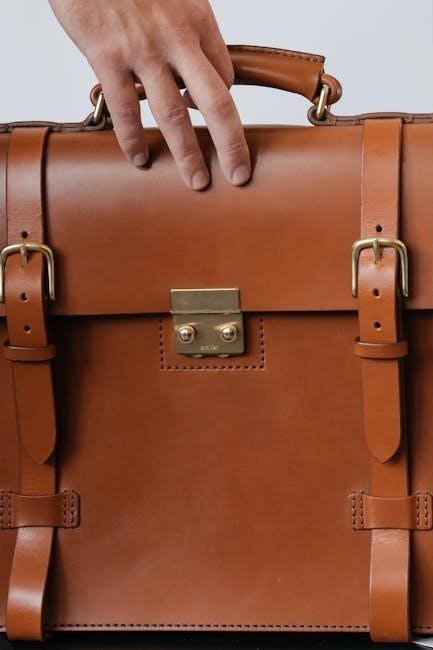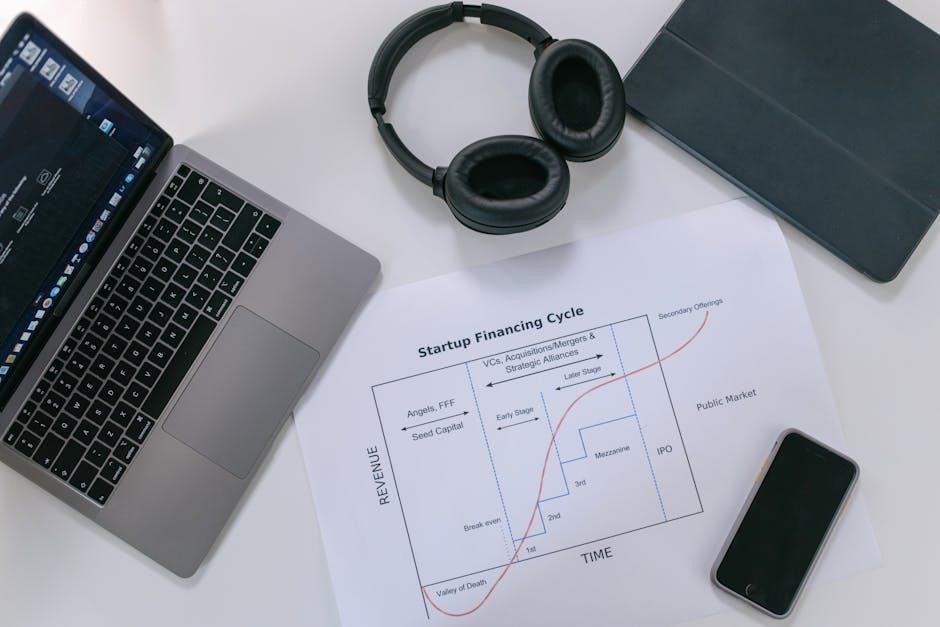The Brief COPE is a Likert-scale questionnaire assessing coping strategies, adapted into French for cross-cultural research. It evaluates multidimensional coping responses in stressful situations, proving essential for French-speaking populations.
1.1 Overview of the Brief COPE Inventory
The Brief COPE Inventory is a 28-item questionnaire assessing coping strategies through a Likert scale. Adapted into French, it evaluates 14 dimensions, including planning, emotional support, and religion. Validated for French populations, it offers a reliable tool for understanding stress responses. Its concise format makes it suitable for research and clinical applications, providing insights into diverse coping mechanisms in various contexts.
1;2 Importance of the French Adaptation
The French adaptation of the Brief COPE ensures cultural relevance and linguistic accuracy, enabling its use in Francophone research and clinical settings. It facilitates cross-cultural comparisons and enhances the validity of coping strategy assessments in French-speaking populations. This adaptation is crucial for ensuring reliability and applicability in diverse contexts, making it a valuable tool for stress management and mental health studies in French-speaking countries.
1.3 Key Features of the Questionnaire
The French Brief COPE questionnaire comprises 28 items, assessing 14 coping strategies. It uses a Likert scale (0-3), making it easy to administer and score. The tool evaluates both adaptive and maladaptive strategies, providing a comprehensive understanding of stress responses. Its brevity and clear structure ensure efficient data collection, while its validated translation ensures reliability, making it a robust instrument for research and clinical applications in French-speaking populations.
Development and Validation of the French Version
The French version of the Brief COPE was developed through rigorous translation and cultural adaptation processes, ensuring linguistic and conceptual equivalence to the original English version.
2.1 Original Version by Carver (1997)
The original Brief COPE, developed by Charles Carver in 1997, is a 28-item questionnaire designed to assess coping strategies. It measures diverse responses to stress, including adaptive and maladaptive behaviors. The inventory is structured around 14 subscales, each representing a distinct coping strategy. This tool has been widely used in psychological research to understand how individuals handle stress and adversity.
2.2 Translation and Cultural Adaptation Process
The French adaptation of the Brief COPE involved a rigorous translation process led by Muller and Spitz in 2003. The forward-back-translation method ensured linguistic equivalence while preserving the original meaning. Cultural adaptations were made to align the questionnaire with French-speaking norms, ensuring relevance and applicability. Pilot testing was conducted to validate translations and assess cultural appropriateness, ensuring the French version maintained the integrity of Carver’s original inventory.
2.3 Validation Studies in the French Population
Validation studies of the French Brief COPE, such as Baumstarck et al. (2017), confirmed its reliability and factorial structure in French-speaking populations. The questionnaire was administered to individuals facing life events, ensuring its applicability. Statistical analyses, including factor analysis, supported the 4-factor structure, aligning with Carver’s original version. These studies demonstrated the French adaptation’s validity, making it a valuable tool for cross-cultural stress and coping research.

Structure and Content of the Questionnaire
The French Brief COPE includes 28 items, each rated on a 4-point Likert scale (0-3). It assesses both adaptive and maladaptive coping strategies, providing a comprehensive evaluation of stress responses.
3.1 Number of Items and Response Format
The French version of the Brief COPE consists of 28 items, each rated on a 4-point Likert scale ranging from 0 (never) to 3 (always). This format allows respondents to indicate the frequency of their coping behaviors, ensuring a nuanced assessment of both adaptive and maladaptive strategies. The structure is consistent with the original version, maintaining reliability across different linguistic and cultural contexts.
3.2 Dimensions of Coping Strategies Assessed
The French Brief COPE evaluates 14 distinct coping dimensions, including adaptive strategies like active coping, planning, and positive reframing, as well as maladaptive ones such as denial, substance use, and behavioral disengagement. Each dimension is assessed with 2 items, ensuring a comprehensive yet concise measurement of diverse coping responses. This structure captures both problem-focused and emotion-focused strategies, providing a balanced view of an individual’s coping repertoire.
3.3 Likert Scale and Scoring System
The French Brief COPE employs a 4-point Likert scale, with responses ranging from 0 (“Never”) to 3 (“Always”). Each item is scored individually, and subscales are calculated by summing related items. Higher scores indicate greater use of specific coping strategies. This system ensures a clear, quantifiable assessment of coping behaviors, facilitating both research and clinical interpretations of an individual’s coping tendencies and preferences.

Methodology for Administering the Brief COPE
The Brief COPE is administered in both dispositional and situational formats, ensuring flexibility in assessing coping strategies in diverse contexts and populations.
4.1 Data Collection Methods
Data collection for the French Brief COPE often involves self-administration, ensuring participant honesty. The questionnaire is distributed in healthcare settings, such as EHPAD in Bordeaux, and completed individually. Both dispositional and situational formats are used, with the process typically taking 10 minutes. This method ensures efficient data gathering while maintaining accessibility for diverse populations, providing comprehensive insights into coping strategies.
4.2 Target Population and Sampling Criteria

The French Brief COPE targets diverse French-speaking populations, including individuals facing stressors like health issues or life events. Sampling prioritizes representativeness, ensuring a mix of ages, genders, and socioeconomic backgrounds. Studies often focus on specific groups, such as elderly in EHPAD structures, to assess coping strategies in varied contexts, ensuring data accuracy and applicability across different demographics.
4.3 Administration Formats (Dispositional vs. Situational)
The French Brief COPE is self-administered and offers two formats: dispositional and situational. The dispositional format assesses habitual coping strategies, while the situational format evaluates responses to specific stressors. This dual approach allows researchers to capture both general tendencies and context-specific reactions, enhancing the tool’s versatility in understanding diverse coping mechanisms across various scenarios and populations.
Psychometric Properties of the French Version
The French Brief COPE demonstrates strong reliability and factorial validity, ensuring accurate assessment of coping strategies. Its internal consistency has been validated through studies on French populations.
5.1 Reliability and Internal Consistency
The French version of the Brief COPE demonstrates strong reliability, with Cronbach’s alpha coefficients ranging from 0.65 to 0.85 across its subscales. The 28-item questionnaire, using a 4-point Likert scale, shows consistent internal consistency, confirming its ability to reliably measure coping strategies. Validation studies on French populations have further supported its structural integrity through factor analysis, ensuring its suitability for assessing diverse coping responses accurately in research and clinical settings.

5.2 Validity and Factorial Structure
The French Brief COPE has demonstrated strong factorial validity through confirmatory factor analysis, aligning with the original 14-factor structure. Studies report correlations with other validated tools like the GHQ-12 and Perceived Stress Scale, supporting its convergent validity. The questionnaire’s dimensional structure has been replicated in French samples, confirming its ability to assess diverse coping strategies effectively across cultural contexts.
5.3 Normative Data and Reference Values
Normative data for the French Brief COPE includes mean scores and standard deviations across diverse populations. Validation studies provide reference values for 14 subscales, enabling comparisons. The questionnaire has been used in samples of French individuals facing various stressors, with scores correlating with other mental health measures like the GHQ-12. These norms facilitate interpretation of coping strategies in French-speaking contexts, ensuring reliable assessment across different demographic groups.
Applications in Research and Clinical Practice
The French Brief COPE is widely used in stress management studies and mental health assessments. It aids in evaluating coping strategies, informing interventions, and integrating with other psychological tools for comprehensive care.
6.1 Use in Stress Management Studies
The French Brief COPE is extensively employed in stress management research to assess coping strategies. It helps identify adaptive and maladaptive responses, guiding interventions. Studies often pair it with tools like the Perceived Stress Scale, enhancing understanding of stress mechanisms. Its reliability ensures valid data, making it a valuable asset for developing targeted stress reduction programs in diverse populations. This application underscores its significance in promoting mental health.
6.2 Application in Mental Health Assessments
The French Brief COPE is widely used in mental health assessments to evaluate coping strategies. It is self-administered, using a Likert scale to measure adaptive and maladaptive approaches. Clinicians integrate it with tools like the GHQ-12 and Perceived Stress Scale for comprehensive evaluations. Its reliability in assessing stress responses makes it a practical tool for identifying at-risk individuals and tailoring interventions, enhancing mental health care in French-speaking populations effectively.
6.3 Integration with Other Psychological Tools
The French Brief COPE is often used alongside other psychological tools, such as the GHQ-12 and Rosenberg Self-Esteem Scale, to provide a comprehensive mental health assessment. Its integration enhances the understanding of coping strategies and stress responses. This multidimensional approach allows clinicians to identify maladaptive patterns and tailor interventions effectively, ensuring a holistic evaluation of mental health outcomes in French-speaking populations.

Comparative Analysis with Other Coping Inventories
The French Brief COPE is compared to tools like the CISS and GHQ-12, highlighting its concise, multidimensional approach to assessing coping strategies, making it a valuable resource for cross-cultural research.
7.1 Comparison with CISS (Coping Inventory for Stressful Situations)
The French Brief COPE differs from the CISS in its brevity and focus. While the CISS assesses three main coping styles (task-oriented, emotion-oriented, and avoidance), the Brief COPE evaluates both adaptive and maladaptive strategies. The CISS includes 48 items on a 5-point scale, whereas the Brief COPE uses 28 items on a 4-point Likert scale. Both tools are validated for French populations but cater to different research objectives, with the Brief COPE offering a more concise approach for assessing multidimensional coping strategies in stressful situations.
7.2 Differences from GHQ-12 (General Health Questionnaire)
The French Brief COPE is distinct from the GHQ-12, as it focuses on coping strategies rather than general mental health. While the GHQ-12 assesses psychological distress, the Brief COPE evaluates adaptive and maladaptive responses to stress. Both tools are validated for French populations but serve different purposes. The Brief COPE provides insights into specific coping mechanisms, making it complementary to the GHQ-12 in understanding mental health outcomes.
7.3 Unique Features of the Brief COPE
The French Brief COPE stands out for its multidimensional assessment of coping strategies, covering both adaptive and maladaptive responses. Its 28-item structure, validated in French populations, offers a balanced evaluation of emotional and problem-focused coping. Unlike other tools, it provides a clear distinction between positive and negative coping mechanisms, enhancing its utility in stress management research and clinical practice.

Implications for Stress Management in French-Speaking Populations
The French Brief COPE offers culturally tailored stress management tools, enabling targeted interventions and enhancing mental health support in French-speaking communities, ensuring effective coping strategies assessment.
8.1 Cultural Specificity in Coping Strategies
The French adaptation of the Brief COPE incorporates cultural nuances, ensuring its relevance to French-speaking populations. The translation process emphasized maintaining cultural specificity to accurately reflect local coping mechanisms. This adaptation is crucial for understanding how cultural factors influence stress responses in France, facilitating more effective interventions tailored to the population’s unique needs. Additionally, it allows for cross-cultural comparisons, enriching global stress management research and enhancing the tool’s applicability worldwide.
8;2 Practical Applications in French Healthcare Settings
The French Brief COPE is widely used in clinical settings to assess coping strategies among diverse patient populations. It helps identify maladaptive coping mechanisms, enabling tailored interventions. Healthcare professionals utilize it alongside tools like the GHQ-12 and Perceived Stress Scale for comprehensive assessments. Its practicality lies in its brevity and ease of administration, making it suitable for monitoring patient progress and informing stress management programs in French healthcare environments.
8.3 Future Directions for Research and Use
Future research should explore the French Brief COPE’s applicability across diverse populations, including vulnerable groups. Expanding its integration with other psychological tools, like the CISS and GHQ-12, could enhance comprehensive stress assessments. Longitudinal studies are needed to track coping strategies over time, while ongoing validation efforts will ensure its relevance in evolving French-speaking contexts, fostering its utility in both clinical and non-clinical settings effectively.
The French Brief COPE is a validated tool for assessing coping strategies, offering valuable insights into stress management in French-speaking populations, with significant implications for future research and clinical applications.
9.1 Summary of Key Findings
The French adaptation of the Brief COPE has been validated as a reliable tool for assessing coping strategies in French-speaking populations. It effectively measures multi-dimensional responses to stress, with strong psychometric properties. The questionnaire’s factorial structure aligns with the original version, ensuring cross-cultural consistency. Its practical applications span research and clinical settings, making it a valuable resource for understanding and addressing stress management in diverse contexts.
9.2 Significance of the French Brief COPE

The French adaptation of the Brief COPE is significant as it bridges cultural gaps in stress research, enabling cross-cultural comparisons. It provides a reliable tool for assessing coping strategies in French-speaking populations, enhancing mental health assessments and stress management interventions. Its validation ensures accurate measurement of diverse coping responses, making it invaluable for both research and clinical applications in French-speaking contexts worldwide.

9.3 Recommendations for Future Studies
Future research should focus on expanding the cultural adaptation of the Brief COPE to other French-speaking populations. Longitudinal studies could explore coping strategy evolution over time. Integrating the Brief COPE with other psychological tools could enhance mental health assessments. Additionally, digital adaptation and accessibility improvements could broaden its reach. Tailoring the questionnaire for specific populations, such as adolescents or elderly individuals, could provide deeper insights into stress management.